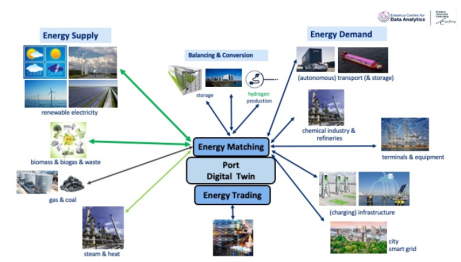MAGPIE
Overview

The energy transition requires creative solutions for the efficient use of energy. Green ports reduce their impact on emissions by decreasing consumption and by making use of flexibility to optimally match the supply and demand of clean energy. The MAGPIE project has the ambition to force a breakthrough in the supply and use of green energy carriers in transport to, from and within ports. We will create energy efficiencies and support developments that make green energy carriers available to the users. By demonstrating and implementing smart solutions in the realm of digitalization and automation, we will facilitate and contribute to the decarbonization of port related transport.
Project description
Through this project a unique collaboration will be formed to address the missing link between green energy supply and green energy use in port-related transport and the implementation of digitisation, automation, and autonomy to increase transport efficiency. MAGPIE accelerates the introduction of green energy carriers (batteries, hydrogen, ammonia, BioLNG and methanol) combined with realisation of logistic optimisation in ports through automation and autonomous operations. The main objective of MAGPIE is to demonstrate technical, operational, and procedural energy supply and digital solutions in a living lab environment to stimulate green, smart, and integrated multimodal transport and ensure roll out through the European Green Port of the Future Master Plan and dissemination and exploitation activities.
Our main purpose in this project is to develop smart energy solutions for green ports by identifying synergies and barriers in the flexible use of energy on intermediate time scales, provide strategic decision support on congestion points and energy systems interventions. Through this project, we will work on designing scenarios to be used in future decision making and the development of Statistical Models for resource availability and use. We will also contribute to the development of the Energy System Simulator with embedded cross-sector and Impact Assessment for flexible energy matching which allows us to assess technical performance, identify congestion points, quantify flexibility needs, identify cost constraints.
Project partners
The MAGPIE consortium, consists of 4 ports (Lighthouse Port of Rotterdam, Fellow ports DeltaPort (inland), Port of Sines and HAROPA), 9 research institutes and universities, 32 private companies and 4 other institutes.
TUD team:

PhD Researcher:
N. (Neda) Vahabzad

Responsible:
Dr. P. (Pedro) P. Vergara Barrios

Responsible:
Dr. S. (Simon) Tindemans

Responsible:
Prof.dr. P. (Peter) Palensky

N. (Neda) Vahabzad
Neda Vahabzad is a PhD researcher in the Intelligent Electrical Power Grids (IEPG) section since March 2022. She received both her master’s and bachelor’s degrees in Electrical Engineering, majoring in electrical power systems, from the University of Tabriz, Iran, in 2020 and 2016, respectively.
She carried out her Master’s thesis on solving the optimal energy scheduling problem of a hybrid electric ship (including energy storage system, PV system, electric heat pump, etc) while handling the uncertainty in the load demand via Information Gap Decision Theory (IGDT) in order to minimize the costs and emission. She is currently working on the MAGPIE project as a part of her PhD. Neda’s main research interests include power system optimization, modeling renewable energy generation, electrical vehicles, maritime transportation, uncertainty modeling, and machine learning approaches.